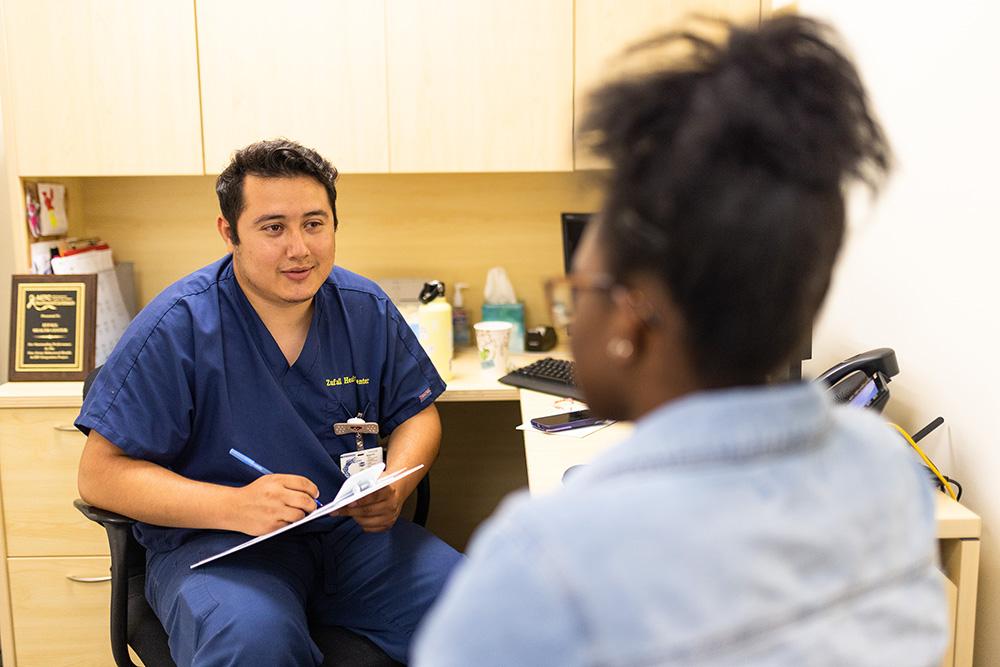

Legal Issues Are Health Issues: How One Zufall Health Case Manager is Paying Forward the Help His Family Received
When he was 10 years old, Zufall Health case manager Erik Moran, his sister, and their mother faced wrongful eviction from their rented house in Morris County. The family was given one month to vacate their home—a violation of their lease—and suffered constant harassment from their landlord.
The landlord spoke only English, and Moran’s mother, an immigrant from Ecuador, only Spanish. Moran took on the distressing responsibility of translating their heated arguments.
Not Something a Kid Should Worry About
“Our situation forced me to grow up so fast. Fighting for your home, for your survival, isn’t something a kid should have to worry about. It wasn’t healthy for me, or for any of us,” said Moran.
The trauma of the landlord’s harassment even triggered panic attacks for Moran’s little sister. Sometimes the attacks warranted ER visits, forcing their single mother to miss work. The family couldn’t afford legal representation to protect themselves and their rights.
Housing Is a Social Determinant of Health
When housing is at risk or inadequate, health suffers. According to the American Heart Association, housing instability or poor housing quality—including problems with heating/cooling and exposure to toxins like mold—impacts cardiovascular health and increases risk for heart attacks, strokes, and heart failure. Substandard living conditions also impact mental health, which is also associated with problems with heart and blood vessel health in both kids and adults.
Moran’s family was able to stay in the house for three more months before safely relocating, largely thanks to the free legal assistance they received from Legal Services of Northwest Jersey (LSNWJ). LSNWJ is a legal services agency that provides lawyers, advice and legal information, and representation for people with limited income.
“Once LSNWJ stepped in for us, I could just be a normal kid again. To this day, I have a clear memory of feeling so alleviated.” Moran said.
From Beneficiary to Advocate
Today, Moran, part of the Zufall staff for more than a decade, is the case manager for the Health, Education, and Legal (H.E.A.L.) program, a medical-legal partnership between our health center and the law firm. Moran connects LSNWJ’s services to people in situations like what he and his mother experienced and serves as their health advocate. He liaises with Zufall providers and clinical staff for medical records, lab records, and letters of testimony to help his patients attain justice and, ultimately, better health outcomes.
The threat of eviction that Moran’s family experienced and other civil legal issues that disproportionately impact low-income and vulnerable people are health issues. In addition to housing matters, the H.E.A.L. program helps people appeal denials of health insurance, disability, food assistance, and other public benefits. Missing out on these benefits has a host of negative impacts including missed doctors’ appointments, inability to manage chronic conditions, and food insecurity. H.E.A.L. also supports claims involving child support, restraining orders, child custody, bankruptcy, wills, and medical debt, among others. Any of these situations can adversely impact mental health, make it harder for people to take care of their physical health needs, and deny their ability to live with dignity.
“The H.E.A.L. program is a critical part of our trauma-informed care. We understand our patients are physically and mentally harmed by their legal issues. We’re willing and able to intervene,” said Moran, who, in 2018, received the Healthcare Hero Award from the New Jersey Primary Care Association for his service through H.E.A.L.
To qualify for H.E.A.L., patients must live in Morris County and earn incomes at or below 250 percent of the federal poverty level. Zufall patients can speak to their provider or other staff member to find out if H.E.A.L. is right for them.
Above: Zufall-Morristown assistant site manager and medical assistant Neil Murphy meets with a patient. Patients are often referred to H.E.A.L. after medical assistants, patient representatives, or providers identify that they are experiencing legal difficulties impacting their health.

